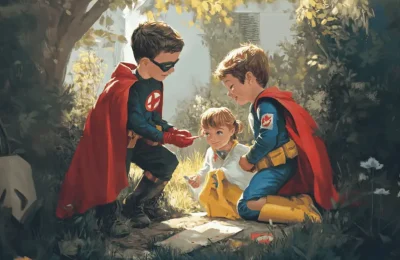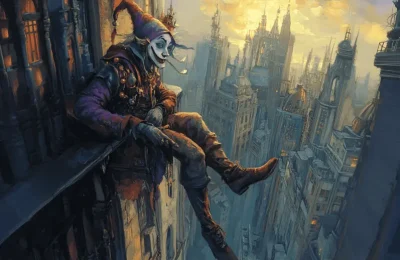Mark Rogers was happy. The last two years of his life had been one hell of a misfortune, but now he had finally made a deal that could change everything. Perhaps it was a reward for all the troubles he had endured. Memories of the past flashed through his mind like scenes from a gritty, low-budget movie—too raw to forget.
At 34, Mark stood inside the small corner store where he’d ducked in to grab a coffee. The cheap fluorescent lights made the early gray in his black hair glint like tinsel. His face, once sharp and vibrant, now looked more angular from stress, with bluish shadows sunk under his eyes like bruises from too many sleepless nights. His coat, wrinkled but clean, hinted at a man who was holding it together by sheer will. Even with the signs of wear, he still held a quiet, exhausted charisma.
He had worked hard and dreamed of opening his own business—changing his status from employee to owner. In his opinion, businesspeople got money, respect, and attention from the opposite sex much more easily than regular folks.
Mark considered himself a skilled expert in online promotion. Over the years, he had built solid managerial experience and useful connections among potential clients. He had everything needed for a strong start: financial savings, market reputation, willpower, and a relentless energy to escape the rat race and become someone significant.
At thirty, he finally turned the dream into reality by launching his online promotion agency. His mind teemed with bright prospects—after all, he had the tools, the knowledge, the hunger. What could possibly go wrong?
At first, business thrived. He secured three companies on annual contracts, offering them social media and online ad services. Two clients asked for a broader scope, requesting full digital marketing support. In response, Mark expanded. He hired a designer, SEO, and PR managers to round out his team. Naturally, the overhead rose, but the new service fees covered it—at least initially.
Four months later, the cracks began to show.
With a growing team, Mark no longer had time to oversee every detail. One client started complaining about the quality of the design and social media work. While Mark scrambled to resolve it, his account manager quit, forcing him to manage all client communications himself. He became buried in operations—no time to recruit, no time to find new business.
When the market crashed, two of his clients slashed their marketing budgets and walked away. He was left scrambling—either find new clients quickly or let most of his team go.
For four painful months, he tried. But with the economic downturn, most companies avoided agencies or wanted services at unsustainable rates. Mark used every last bit of company income and his personal savings to keep paying salaries. His certainty faltered, and with it, so did his performance.
Physically, he was changing. The confident, well-groomed man he had once been gave way to someone hunched and hollowed. His once jet-black hair had streaks of gray, and the heavy blue shadows under his eyes told of sleep lost to anxiety. His sharp gray eyes carried a sheen of pain, and a chronic cold followed him like a loyal ghost. Every sign pointed to the same conclusion: his life was going terribly wrong.
He seriously considered closing the business, burying the dream of ownership for good. The only thing holding him back was the one thing no downturn could touch—his will. He didn’t want to give up. He kept looking for clients in every way he could.
And today, luck had smiled.
He made a pitch, gave a strong presentation, and signed an annual digital support contract with a major company. This client could turn the agency’s cash flow around—and serve as a stellar case study for future prospects.
Life is getting better, Mark thought, stepping out of the store, coffee warming his hand, not knowing that somewhere far beyond his reach, an emergency meeting had already begun—its sole purpose: to destroy his plans.
Somewhere Else
Three angels met in a room suspended between dimensions: the Guardian, the Informer, and the Destroyer. It was rare for the three of them to meet together. Usually, they passed the care of their human from one to another without such formalities. But today called for an exception. The Destroyer was the first to speak.
“Colleagues, as you know, our mentee Mark Rogers signed a contract today. His agency will thrive in the coming years. I want to ask Informer—how did this happen?”
Informer looked uneasy. His voice was soft.
“I did everything I could. I sent dreams—scenes of him as a boy, painting with joy. When doubts surfaced, I showed him videos of entrepreneurs leaving it all behind to follow creative callings. I even nudged real-life meetings with artists and writers, but he only saw them as contractors, never role models. He doesn’t recognize my signals. He’s chasing the kind of happiness society taught him to want.”
Punisher interrupted.
“People have free will, yes. But they also have destinies—paths where their souls shine. It’s our job to guide them toward that. Right now, we’re failing. He’s meant to be a painter—someone whose work will touch millions. But he’s drowning in business. Look at his thread—”
A glowing line appeared midair, showing past and future images of Mark’s life. To beings like these, time was fluid.
“Here, he signs three more big contracts. Here, he buys a house. A car. He marries, has a child. Fast forward ten years—depression. A joyless existence. Affairs. His marriage collapses. He’s empty, spent. His soul has no fuel left. All that effort for success turned him into a ghost before fifty. Do we really want that?”
Silence fell. Finally, the Guardian spoke.
“You want to wreck the deal?”
“No,” Destroyer said. “If that were the plan, I wouldn’t have called this meeting. I’ve already sabotaged several opportunities in his past. Each time, he rebuilt. His tenacity is—impressive. But so long as he measures life by social success, light-touch interventions won’t work. I want to completely destroy the business. No path back. Maybe a government investigation… or an accident that prevents him from working altogether.”
“You know I can’t allow that,” Guardian said sharply. “No harm to his body or mind. I’d rather he walk his chosen path than suffer irreversibly.”
“Then what do we do? Minor hardships won’t shift him.”
Informer, quiet until now, cleared his throat.
“What if we give him what he thinks he wants? His chase for wealth and success is rooted in fear—he believes he must achieve to be worthy of love. What if he meets a woman who loves him for who he is? Someone who shatters that illusion?”
“But the right woman isn’t meant to arrive for five more years,” said Destroyer. “He needs growth before that.”
“Then we give him the wrong woman. One he’ll fall for, who will break his heart. Afterward, his business will crumble from neglect, and he’ll face the questions he’s avoided all his life.”
Guardian thought for a moment.
“He’s had breakups before. Painful, yes—but survivable. I’ll allow it.”
“Then it’s settled,” said Informer. “I’ll coordinate with her angels and start crafting their encounter.”
Somewhere in Our World
Mark met Lissa on a dating app. He rarely used the app and dated even less, but his Thursday opened up when a networking meetup was canceled. On impulse, he messaged her.
Lissa, 28, had installed the app under pressure from friends eager to solve her singlehood. Tall, elegant, with striking green eyes, she’d agreed to go on three dates—then delete the app. Mark was number three. He wasn’t her usual type, but his messages were witty and charming.
“At least the evening will be fun,” she thought on her way to meet him.
She looks better than her photos, Mark thought when he saw her. His goal for the night shifted: he wanted not just dinner—but a second date.
They clicked. Mark was smart, funny, and clearly driven. Lissa didn’t imagine marrying him, but he was far better than her last few dates. She decided to see him again.
Dates turned into a relationship. Lissa enjoyed the attention and care, though she never envisioned a long-term future with Mark. For him, it was entirely different. He fell deeply in love—so much so that everything else began to lose its importance. His agency, once the center of his universe, faded into the background. Operational issues piled up, but Mark, caught in a whirlwind of romance, no longer paid close attention. Clients began noticing a decline in service quality—delayed responses, lackluster campaigns, careless mistakes. One by one, they started pulling out. But Mark didn’t panic. For the first time in years, he wasn’t chasing success—he was chasing love. In his mind, contracts could be replaced. A business could be rebuilt. But a woman like Lissa? She felt irreplaceable.
But Lissa began pulling back. She dodged his suggestion to move in, claiming it was too soon. Her evenings filled up. Their meetings thinned. The spark in her eyes dimmed, replaced with something like guilt.
Finally, she told him the truth. She cared—but not like he did. For her, it was a fling, not a foundation. She wanted out before hurting him more.
Mark’s world collapsed.
Lissa had become his reason for everything. Without her, what was the point?
“I’m just not meant to be happy,” he muttered. “I’m tired.”
He had no energy left to fight. The agency, once his proudest creation, now felt like a meaningless burden. Everything he’d built seemed hollow without Lissa. Numb and hollowed out, he picked up the phone and called his deputy.
“I’m closing the agency,” he said in a low, detached voice. “I don’t need it anymore. Notify the clients, settle the layoffs, make sure everyone gets what they’re owed. I’ll be away for a couple of weeks—urgent personal matters. Handle the rest.”
He hung up without waiting for a response and sat in silence, staring at the wall. Then, without another thought, he reached for the bottle of whiskey.
Somewhere else
“Did we do the right thing?” the Informer asked the Destroyer.
“We ended his false life,” the Destroyer replied. “Now, the seed of a new one can grow. Pain is the gate. Look at his thread. With your help, he now stands at a turning point. Let’s hope he chooses well.”
Back in our world
The agency was gone. Mark let go completely. Depression swallowed him whole. Friends reached out. He didn’t respond. Days bled into nights. He rarely left the apartment.
Cold seeped into his bones. He went looking for a blanket—and found, buried in the closet, an old sketchbook and pencils.
Just yesterday, he had seen a video: drawing helps with depression. He remembered loving to draw as a teen. He’d brought these pencils with him when he moved out of his parents’ house—but had never used them. Life had gotten busy: classes, jobs, meetings. Art belonged to his past.
Now, he stared at the blank page.
My life is on pause. I have nothing but this ache. Maybe… maybe drawing will help me hear my soul again. At least I can try.
That evening, Mark opened the sketchbook. The first thing his hand reached to draw was the woman who had brought him to this breaking point. And as he sketched her face, line by line, something long dormant within him stirred—his soul, once numb and silent, began to come alive again.







